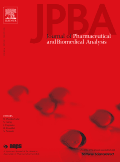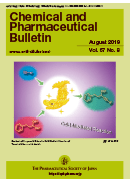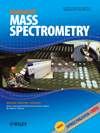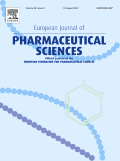
Journal of Pharmaceutical and Biomedical Analysis
Scope & Guideline
Innovative insights for tomorrow's drug discovery.
Introduction
Aims and Scopes
- Pharmaceutical Analysis:
The journal emphasizes the development and validation of analytical methods for the quantification of active pharmaceutical ingredients (APIs), excipients, and impurities in drug formulations. This includes techniques like HPLC, LC-MS/MS, and NMR. - Biomedical Analysis:
Research that investigates the pharmacokinetics, pharmacodynamics, and therapeutic effects of drugs in biological systems is a core focus. Studies often involve metabolomics and proteomics to elucidate drug action and interactions. - Quality Control and Assurance:
The journal covers methodologies for quality assessment of pharmaceutical products, including stability studies, impurity profiling, and compliance with regulatory standards. - Natural Products and Herbal Medicines:
Research involving the characterization and analysis of traditional medicines and natural products is highlighted, including their bioactive constituents and pharmacological effects. - Innovative Analytical Techniques:
The journal encourages the use of cutting-edge technologies such as mass spectrometry, chromatography, and biosensors for drug analysis, emphasizing the importance of novel methodologies in enhancing analytical performance. - Pharmacokinetic Studies:
Pharmacokinetic and pharmacodynamic studies utilizing advanced analytical techniques are a significant area of publication, focusing on drug absorption, distribution, metabolism, and excretion.
Trending and Emerging
- Metabolomics and Lipidomics:
Studies utilizing metabolomics and lipidomics to explore disease mechanisms, drug effects, and patient responses are increasingly prominent. This trend highlights the importance of understanding complex metabolic networks in drug development. - Biosensors and Point-of-Care Testing:
Research on biosensors and rapid diagnostic tools for real-time monitoring of drug levels and disease markers is on the rise, reflecting a growing interest in personalized medicine and accessible healthcare solutions. - Pharmacogenomics and Personalized Medicine:
Analyses that integrate pharmacogenomics into therapeutic strategies are gaining traction, emphasizing the need for individualized treatment approaches based on genetic profiles. - Advanced Drug Delivery Systems:
Innovations in drug delivery methods, including nanotechnology and targeted delivery systems, are emerging areas of research, highlighting the quest for improved efficacy and reduced side effects in pharmaceuticals. - Natural Products and Traditional Medicine Research:
There is a resurgence of interest in studying traditional medicines and natural products, particularly their active components and mechanisms of action, driven by a holistic approach to health and wellness. - Environmental Analysis of Pharmaceuticals:
Research focusing on the environmental impact of pharmaceuticals and the detection of contaminants in water and soil systems is trending, reflecting a global concern for sustainability and public health.
Declining or Waning
- Traditional Analytical Methods:
There appears to be a waning interest in conventional analytical methods, such as basic UV-Vis spectroscopy and simple HPLC methods, as researchers increasingly favor more sophisticated techniques that provide greater sensitivity and specificity. - General Drug Stability Studies:
There has been a noticeable decrease in studies focused solely on the stability of pharmaceutical compounds without integrating innovative analytical approaches or linking stability to pharmacological effects. - Non-Clinical Pharmacokinetic Studies:
Research that does not incorporate advanced modeling or translational aspects of pharmacokinetics is less frequent, as there is a growing emphasis on studies that can directly influence clinical practices. - Single Compound Focus:
There is a trend away from research that investigates a single compound in isolation, with more emphasis on multi-component systems and complex formulations that reflect real-world applications. - Basic Toxicology Studies:
Publications focusing solely on basic toxicology without a strong analytical or pharmacokinetic component have seen a decline, as the field moves towards integrated approaches that consider the full biological impact of compounds.
Similar Journals

Analytical and Bioanalytical Chemistry Research
Pioneering Insights in Bioanalytical Research.Analytical and Bioanalytical Chemistry Research is an esteemed open-access journal published by the Iranian Chemical Society, dedicated to the advancement of knowledge in the fields of analytical chemistry, biochemistry, and spectroscopy. Since its inception in 2014, this journal has provided a platform for researchers, professionals, and students to publish and access high-quality research articles that contribute to the understanding of chemical analysis and bioanalytical methods. With an ISSN of 2383-093X and an open-access model that promotes global dissemination of findings, it ensures that innovative research reaches a broad audience. The journal has consolidated its presence in the scientific community, currently ranked in quartile Q4 for analytical chemistry, biochemistry, and spectroscopy as of 2023. Its Scopus rankings, including a percentile of 34th in Analytical Chemistry, reflect its commitment to quality research and scholarly contribution. Situated in Tehran, Iran, the journal serves as a vital resource for academic discourse, offering insights into emerging trends and methodologies in analytical and bioanalytical chemistry.

CHEMICAL & PHARMACEUTICAL BULLETIN
Connecting theory with practice in the pharmaceutical landscape.CHEMICAL & PHARMACEUTICAL BULLETIN, published by the Pharmaceutical Society of Japan, has been a cornerstone in the fields of chemistry, drug discovery, and medicine since its inception in 1958. With an ISSN of 0009-2363, this esteemed journal offers a platform for the dissemination of innovative research and critical insights contributing to these dynamic disciplines. Housed in Tokyo, Japan, it is strategically poised to bridge the gap between chemical sciences and pharmaceutical applications. Although the journal operates under a traditional subscription model and does not currently offer open access, it maintains a solid reputation, evidenced by its Q3 category rankings in multiple relevant fields and its percentile positions in Scopus, specifically 48th in General Chemistry and 30th in Drug Discovery. Researchers, professionals, and students alike will find invaluable resources within its pages, as it diligently covers shifting paradigms and emerging methodologies critical to advancing both theoretical understanding and practical applications in the pharmaceutical realm.

MOLECULES
Advancing Chemistry Through Open Access InnovationMOLECULES, published by MDPI, stands as a prominent open-access journal dedicated to the field of chemistry, with an exceptional reputation in various sub-disciplines. Since its inception in 1997, this journal has committed itself to the dissemination of innovative research, spanning topics in Analytical Chemistry, Organic Chemistry, Pharmaceutical Science, and Drug Discovery. With impressive rankings across Scopus categories—including a coveted Q1 designation in both Analytical Chemistry and Pharmaceutical Science—MOLECULES is recognized as a vital resource for researchers, professionals, and students aiming to stay at the forefront of scientific development. The journal’s data reflect its wide-ranging influence, holding high percentiles in multiple chemistry categories, thereby ensuring that its articles reach a significant audience. As an open-access journal, it provides unparalleled access to its content, available freely and globally, which promotes further advancement and collaboration within the scientific community. Its ongoing commitment to high-quality research from 1996 to 2024 reinforces its status as a leader in the academic publishing landscape.

Journal of Chemical Metrology
Empowering Researchers with Cutting-Edge MetrologyJournal of Chemical Metrology is a vital resource in the evolving fields of Analytical Chemistry, Electrochemistry, Spectroscopy, and Toxicology, published by ACG PUBLICATIONS in Turkey. With a focus on advancing the understanding and application of chemical metrology, this journal aims to bridge gaps in quantitative analysis, offering researchers and professionals a platform to disseminate groundbreaking studies and methodologies. Although it operates under a traditional access model, readers can benefit from its insights as the journal continues to gain recognition with its 2023 rankings placing it in the Q3 and Q4 categories across various scientific disciplines. From its inception in 2019 to its projected convergence in 2024, the journal has been instrumental in fostering collaboration and innovation in chemical sciences, making it an essential tool for students and researchers dedicated to enhancing analytical techniques and ensuring safety through effective toxicological assessments.

Analytical Science and Technology
Pioneering research that shapes the landscape of analytical science.Analytical Science and Technology is a prominent journal dedicated to advancing the fields of analytical chemistry and technology, published by the Korean Society for Analytical Science. Based in South Korea, this journal serves as a vital platform for researchers, professionals, and students committed to exploring innovative analytical techniques and methodologies. Although it is classified under Q4 in various subject categories, including Agronomy and Crop Science, Environmental Chemistry, and Pharmacology, the journal aims to provide critical insights and contributions to the scientific community. With ISSN 1225-0163 and E-ISSN 2288-8985, it spans a converged timeline from 2019 to 2024. Despite its current standings in Scopus rankings, the journal is dedicated to improving its visibility and impact through rigorous peer review and high-quality publications, fostering knowledge sharing within its diverse academic fields. Researchers looking for a reliable outlet for their findings are encouraged to consider this journal as it continues to strive for excellence in analytical science.

Turkish Journal of Pharmaceutical Sciences
Pioneering Insights in Drug Development and TherapeuticsThe Turkish Journal of Pharmaceutical Sciences, an esteemed publication by GALENOS PUBL HOUSE, has been a prominent platform for research and innovation in the fields of Pharmaceutical Sciences and Molecular Medicine since its inception as an Open Access journal in 2004. Based in Turkey, this journal serves as a vital resource for researchers, professionals, and students keen on exploring the latest advancements in drug development, pharmacology, and therapeutic innovations. With an ISSN of 1304-530X and an E-ISSN of 2148-6247, the journal is indexed in leading databases and has demonstrated strong rankings in the Scopus index, notably securing the second quartile in Pharmaceutical Sciences. Furthermore, it fosters academic collaboration and knowledge dissemination by making its content freely accessible. The journal aims to inspire groundbreaking research, providing an important academic forum for the dissemination of valuable insights that impact the pharmaceutical sector and contribute to global health.

JOURNAL OF MASS SPECTROMETRY
Elevating Research Standards in Chemistry and MedicineThe Journal of Mass Spectrometry, published by Wiley, is a vital resource for researchers and professionals in the fields of chemistry and medicine. With an ISSN of 1076-5174 and an E-ISSN of 1096-9888, this journal specializes in the latest advancements in mass spectrometry, an essential analytical tool used in various applications including drug development, environmental monitoring, and biological research. Positioned in the Q3 quartile for both Medicine (miscellaneous) and Spectroscopy categories in 2023, the journal stands out for its commitment to disseminating high-quality research findings. Its Scopus ranking places it at 36th in the field of Chemistry _ Spectroscopy, within the 53rd percentile, reflecting its growing impact and relevance. Researchers are encouraged to submit their work and explore cutting-edge articles published between 1995 and 2024. Despite its non-open access model, the journal remains accessible through various academic platforms, fostering a rich exchange of knowledge among scientists worldwide.

ACTA PHARMACEUTICA
Fostering collaboration through open-access research excellence.ACTA PHARMACEUTICA is a distinguished open-access journal published by SCIENDO, dedicated to advancing knowledge in the fields of medicine and pharmaceutical sciences. Established in 1992, the journal has made significant contributions to the scholarly community, providing a platform for innovative research and discussion. With a strong presence in both Q2 and Q3 quartiles across various categories including Pharmaceutical Science and Pharmacology, ACTA PHARMACEUTICA ranks favorably, positioning its contributions in the upper tiers of the field. The journal's commitment to open access since 2007 ensures that both practitioners and scholars have immediate access to cutting-edge developments, thereby fostering collaboration and knowledge sharing. With its scope spanning a broad spectrum of pharmaceutical and biomedical research, ACTA PHARMACEUTICA is an essential resource for researchers, professionals, and students keen to stay abreast of the latest advancements and trends in these vital areas of study.

Indian Journal of Pharmaceutical Education and Research
Empowering research, shaping pharmaceutical education.Indian Journal of Pharmaceutical Education and Research, published by the Association of Pharmaceutical Teachers of India, is a pivotal platform for scholarly discussion in the field of pharmacology, toxicology, and pharmaceutics. ISSN 0019-5464, this esteemed journal aims to foster the exchange of innovative research, clinical advancements, and educational practices within the pharmaceutical sciences community. As a Q3-ranked journal in its category as of 2023, it reflects a commitment to upholding the standards of academic excellence and contributes significantly to the ongoing development of pharmaceutical education. The journal is a valuable resource for researchers, professionals, and students, with content spanning various key areas including drug formulation, safety, and the latest trends in pharmaceutical education. By providing open access to its research and reviews, the journal ensures that vital information is disseminated widely, promoting collaboration and learning among stakeholders in the pharmaceutical sector. Based in Bangalore, India, the journal has been instrumental in highlighting regional research while fostering a global dialogue in pharmaceutical sciences. As it continues its journey from 2008 to 2024, it remains dedicated to impacting the field through rigorous peer-reviewed content and engaging with contemporary challenges in healthcare and education.

EUROPEAN JOURNAL OF PHARMACEUTICAL SCIENCES
Advancing Pharmaceutical Knowledge for a Healthier TomorrowThe European Journal of Pharmaceutical Sciences is a prestigious academic journal dedicated to advancing the field of pharmaceutical science. Published by Elsevier, the journal boasts an impressive impact factor and is categorized in the Q1 quartile for pharmaceutical science as of 2023, signifying its influence and reputation within the academic community. With a Scopus ranking of #20 out of 183 in the fields of pharmacology, toxicology, and pharmaceutics, the journal provides a vital platform for researchers and practitioners to disseminate innovative studies and groundbreaking research that push the boundaries of drug development and delivery. Based in the Netherlands and operating since 1993, the journal seeks to cover a broad scope of topics related to pharmaceutical sciences, encouraging rigorous evaluations and discussions that enhance the understanding and application of this critical field. The absence of open access underscores the commitment to maintaining high scholarly standards, while still offering avenues for libraries and institutions to provide access to cutting-edge research. As the journal converges towards its 2024 milestones, it continuously aims to foster a vibrant exchange of knowledge among its diverse readership, comprising committed researchers, professionals, and students.